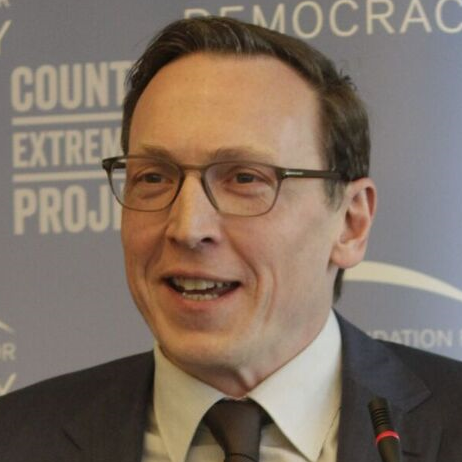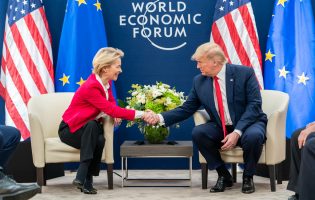“White Supremacy 3.0”
The possible militarization of combat sports networks in the context of the Russia-Ukraine war
Speaker:
Alexander Ritzmann, DAAD/AGI Research Fellow
Moderator:
Eric Langenbacher, Senior Fellow and Director of the Society, Culture & Politics Program at AGI
A new trend and strategy has been emerging amongst RWE (right-wing extremist) or REMVE (racially or ethnically motivated violent extremist) movements and actors. This development, which can be called “white supremacy 3.0”, comprised of combat sports and a “white warrior” ideal already present in “old school” RWE/REMVE, is now being merged with mainstream pop culture, media and arts elements. The objective of this “beautification” of RWE/REMVE violence is to become more attractive and to recruit more members. Driving this network-based “white supremacy 3.0” strategy is the U.S. “Rise Above movement (RAM)/Active Club (AC)”, which currently has affiliated local “Active Clubs” in at least 25 U.S. states as well as in France, Germany, the Netherlands, Estonia, Sweden and Canada. Connected to this U.S. “Active Club” network are two key RWE/REMVE organizations, the German “Kampf der Nibelungen” and “White Rex”. All three organizations are transnational in nature, have been cooperating for years and have their own events and tournaments, sports clothing brands and online merchandise stores to fund their activities. Those three key organizations are the engines of a wider network of likeminded groups in the EU, the United States, and Eastern Europe, in particular in Ukraine and Russia.
This webinar analyzes to what degree the new “white supremacy 3.0” strategy is anchored in different U.S. REMVE milieus and to what degree it is being exported to other countries, especially in the European Union. It will also investigate to what degree, and in the context of the Russian-Ukrainian war, RWE/REMVE combat sports networks in the EU and the United States are cooperating and how such networks could be used to plan and execute attacks or to grow from a combat sports focus to a military/militia phenomenon, also by connecting with existing RWE/REMVE militias.
Alexander Ritzmann
Mr. Alexander Ritzmann is a senior advisor with the Counter Extremism Project (CEP) Berlin, where he focuses on the effective countering of extremist/terrorist actors, in particular on violence-oriented far-right extremist (transnational) networks, offline and online. He is also advising the European Commission’s Radicalization Awareness Network (RAN), where he particularly focuses on extremist ideologies, narratives, and strategic communications. From 2018 until the end of the project in 2021, he co-developed and facilitated the “International Forum for Expert Exchange on Countering Islamist Extremism” (InFoEx) at the German Council on Foreign Relations (DGAP), where he still serves as an associate fellow.
Event Summary
Background
In 2020, the German Federal Foreign office commissioned the Counter Extremism Project to examine violent right-wing extremism and terrorism. The project tracked the transnational activities of extremist actors in six countries. After the outbreak of Russia’s war in Ukraine, researchers at the Counter Extremism Project became increasingly interested in using this mapping to determine which extremist actors would join the conflict. This was more challenging than when researchers tracked Islamist extremists who left Europe to join the fight in Syria. Those fighters posted their location and motivations on social media, while there is more operational security among those who have joined the conflict in Ukraine.
Another lesson learned from the extremist fighters in Syria and Iraq is the management of their return to Europe. The militarization of right-wing extremist (RWE) networks through their involvement on both sides of the Russia-Ukraine war has given extremists the tools and combat experience necessary to pose a much greater threat to countries within the EU. Europeans should be prepared for the return of these foreign fighters to minimize their ability to carry out an attack, including reducing arms smuggling into Europe. Between 2019 and 2023, 34 illegal weapons arsenals were discovered in the right-wing extremist scene in Austria.
Active Clubs
The latter half of the presentation focuses on a specific niche of right-wing extremist groups in depth: combat sport “Active Clubs” and the related “White Supremacy 3.0” strategy, which shapes their principles, and how these Active Clubs spread across the globe.
Active Clubs originated in the United States and are a network of localized white supremacist groups, inspired by Robert Rundo’s white supremacist Rise Above Movement (RAM). These clubs, numbering around fifty in the United States and over twenty in different European countries, including Germany, operate under a decentralized franchise system. Their primary objective is to present a non-threatening image for right-wing extremism, promoting fraternity and a white “warrior spirit.”
There are three main waves of right-wing extremism: the traditional skinhead movement (1.0), the alt-right “keyboard warriors” (2.0), and the Active Clubs that strive to take more tangible action than the 2.0 groups but without resorting to terrorism (3.0). The Active Clubs aim to give right-wing extremism a more acceptable face, employing a strategy known as “beautification” or “mainstreaming.” However, the presence of Dennis Kapustin—a Russian citizen and the person responsible for the spread of Active Clubs in Europe—during a raid with the Russian Volunteer Corps in March 2023 suggests a connection to more extremist elements. Moreover, the Active Clubs’ logos are all variants of the Celtic cross, a symbol that has a long history of being exploited for extremist purposes. These attempts at mainstreaming, therefore, are no more than a facade.
Quantifying the exact number of Active Club members is challenging, but it is evident that there are thousands of individuals involved in RWE combat sports. Ongoing research focuses on whether the “beautification” strategy is leading to increased membership, particularly if adopted in the European Union.
Discussion
In the Q&A session, Ritzmann discusses whether there were any members in Active Clubs with ties to the January 6th attack on the Capitol or the Reichsbürger Raid in Germany. He noted that while the individuals on trial for these events were never Active Club members, the movement has since gained popularity, and members of the Proud Boys, an extremist hate group in the United States, began joining the network in 2022. Other questions center on the role of identitarian ideology and addressed the parallels between these new RWE movements and Islamic extremism.
Part of the discussion revolves around the role that women play in these clubs. One of the weaknesses of Active Club networks is their lack of women leaders. Nevertheless, the Active Club network will likely begin recruiting women soon, evidenced by a recent initiative to sell soaps “made by white hands,” the consumers of which could be both men and women.
Participants also discuss what actions the government might take to check or combat these growing groups. Some proposals include publicly exposing the “beautification” strategy these clubs engage in and employing an “Al-Capone approach” to those who profit from the movement through the sale of T-shirts and other merchandise. These “entrepreneurs of extremism” are generally the leaders of these movements and periodically engage in tax evasion or other criminally motivated acts. Legal action for these crimes is much more straightforward than navigating the complexities of free speech and freedom of association. However, legal action to combat extremism is typically where U.S. and German strategies diverge, with Germany generally employing a more preventative approach.
This event is supported by the DAAD with funds from the Federal Foreign Office.







